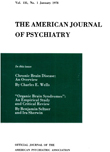Abstract
Since the advent of psychotropic drugs a decade ago, the number of psychiatric patients hospitalized at any one time has been decreasing as the average length of stay in the hospital has become shorter, but readmission rates have markedly increased. Why are these drugs not as effective in keeping patients out of the hospital as they are in reducing the need for lengthy inpatient treatment? Two of the factors that may contribute are examined. It is hypothesized that : 1) outpatients frequently do not take the drugs according to instructions and 2) local nonpsychiatric physicians are less effective in choosing the appropriate drugs and dosage levels than the mental hospital staff.
A random sample of 100 females, voluntarily admitted to a clinical psychiatric service at a university hospital, were questioned in a standardized, one-hour interview to assess all drugs taken by the patient during the three months preceding admission. The patient's claims were relayed to the referring physician to he compared with his records. Further corroboration came from interviews with the patient's family or friends, who were also asked to bring in any drugs the patient kept around the home. This allowed in many instances a check on whether the patient had used the prescribed amount of drug.
In half the cases the opportunity to avert the need for hospitalization with the proper use of drugs was lost or severely curtailed by the patients' own actions: ten percent did not consult any physician prior to admission and another 40 percent did not take the drugs as prescribed for them by the physicians they had consulted. In 64 percent of the cases the physician also failed to take full advantage of out-patient drug treatment before initiating hospitalization: in 24 percent no psychotropic drugs were prescribed at all, in another 24 percent medication prescribed seemed inappropriate to the hospital psychiatrists for the condition found on admission and in 16 percent appropriate medication, but in insufficient dosages, had been prescribed. In only 26 percent of the cases did the drug treatment prescribed prior to admission seem to have been such that it was unlikely that admission could have been prevented by a change in medication.
Since we are dealing with clinical admissions to a university hospital, our sample cannot be considered representative of the entire population admitted to psychiatric hospitals. Other limitations of the study are discussed, e.g., the possibility that the patients' condition took on different features with hospitalization, that the choice of treatment is inherently easier in the hospital and that prevention of hospitalization may not always be desirable.
A decline in the rate of readmissions to mental hospitals could probably be achieved by making greater efforts to insure the patient's cooperation in outpatient treatment with psychotropic drugs. Improving the physicians' skill in administering outpatient chemotherapy would seem to be an urgent task for psychiatrists.

